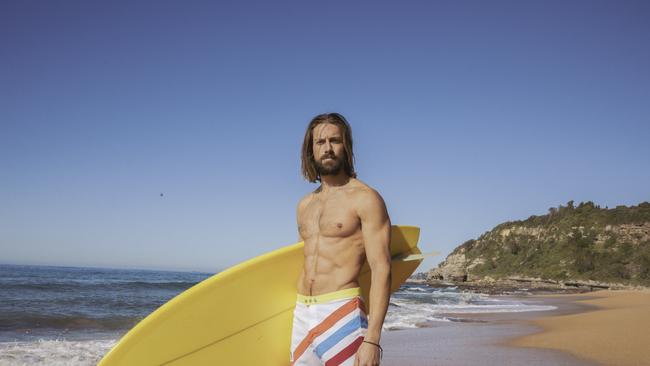Sex, surf and lots of money: how a culture cashed in
Barons follows a group of young surfers, living in a Kombi van, who go on to play a vital part in a multimillion-dollar industry.

‘We love surfers for the same reasons we have always admired doctors and pilots and firemen and shamans, for the same reasons we admire excellent soldiers: because despite themselves they have bowed to a force much greater than themselves, which in this case is the wave, and submitted to the gnarly rigours of its discipline,” the best-selling author Peter Heller wrote in Kook: What Surfing Taught Me About Love, Life, and Catching the Perfect Wave.
And it might be an epigraph to the new ABC eight-part series Barons about a group of young surfers, in the early 1970s when the world was turning on its axis, who allowed themselves to be shaped and polished by the sea and then were overtaken by the spirit of enterprise. It’s the story of how hard-core grassroots devotion and worship led to the creation of a global industry: screen-printed surf logo T-shirts, baggy coloured shorts and custom, super durable surf bathers for blokes and flattering UV surf suits for chicks storming the market.
It’s set in 1971 when the energy of cultural dissent is becoming constructive and personally liberating for many young people in this country; it wasn’t about knowing the right people, pulling strings or private school connections. Social action was connected to intellectual passion, and if enough people joined together to speak out on injustice, passion could change the world. Or so it was fiercely believed.
And the series follows a group of young surfers living in a Kombi van full of surfboards, maps, sleeping bags, and tents, joyously travelling along the coast in search of a new surfing utopia. Non-conformist hippy dudes, most determined to somehow avoid the fate that awaited the young men whose birth dates were chosen in the detested Vietnam ballot, who ironically will later devote years to chasing a capitalist dream.
The press notes give us a kind of pungent through-line for the series: “Seduced by the power of nature; corrupted by the nature of power”, which does neatly encapsulate the central idea of the narrative, evident even as the first episode comes to an emotional climax and the birth of a bitter rivalry. And it also suggests one of the strong themes of the story, the way the power of friendship always sustains – until it doesn’t.
Barons was created by some of the stalwarts of the local TV industry, Michael Lawrence, John Molloy and Liz Doran, between them responsible for shows as diverse as Fighting Fear, Save This Shark, The Gloaming, Molly, Head First and The Tailings. Director is the accomplished Shawn Seet. Known for series like The Code, Peter Allen and Deep Water. And the legendary award-winning Taylor Steele is the Surf Unit director, not only one of the most influential people in surfing but he also launched his own tequila company with Spike Jonze and The Beastie Boys. Doran wrote the show, along with Matt Cameron and Marieke Hardy.
Lawrence too is also prominent in the surfing industry, an entrepreneur who with his business partner Nicholas Cook created Garage Entertainment – one of the world’s leading distributors of surfing content. Their trading motto: “Unlock Adventure”.
It’s all very loosely based on Phil Jarratt’s Salts and Suits, his comprehensive history following the birth of surf industry brands such as Quiksilver, Rip Curl and Billabong in the 1970s. “When Salts and Suits was published, chapter heads like ‘The chairman is an asshole’ and ‘The blowtorch brothers’ didn’t win me many friends within the industry, but it was all true and it made a fascinating story that won several awards and was short-listed for a prize for business literature,” Jarratt writes on his website.
“He’d surfed and clubbed with the elite, ghosted their biographies, edited magazines, produced documentaries, won Australian Surfing Hall of Fame’s media award four times, moonlighted as a surfing industry suit and penned sharp accounts of the experience,” his friend Neil Jameson wrote in a review of Jarratt’s excellent memoir Life of Brine. “Oh, yeah, and he’d surfed most places on wave-riding’s world map.”
Lawrence initiated the project after reading Jarratt’s book; he was immediately hooked and took out an option. (Jarratt is credited as a script consultant too for the series.)
“I’d been watching The Social Network and Mad Men and The Wolf of Wall Street, and I thought, ‘now’s the time to tell what surfing’s genesis was as a massive industry’,” Lawrence says in the production notes. “It’s such a fascinating story, how the businesses were founded and the characters, all with that Australian voice of larrikinism and fearlessness and freedom running through it.” As he says, it was a time when some of the most celebrated surfers of all time were coming through. “It was when surfing was considered art, they were becoming rock stars. For us, it was so exciting to look in detail at the beginning of something, the beginning of this massive cultural shift.”
He teamed with Molloy, who had produced the hit miniseries Molly and Doran. The pair enlisted writers such as Hardy and Cameron (who also co-created and wrote Molly).
“We felt like this could be a reflective cautionary tale, but with all the good ingredients for TV: greed, ego, power, friendship, sex and money,” says Lawrence. “I think Barons is going to be a great export from Australia of an international story. Many people didn’t know that out of a one-horse town in Australia came creations that would eventually go on to generate multibillion-dollar industries that didn’t exist before.” But while they had Jarratt’s account of the story, they decided to fictionalise it rather than tell the actual tale in any kind of documentary fashion.
“The key for us was to make it become fiction,” explains Lawrence. “We had to own it in a way that we could move these people around with freedom.” So the group devised a new set of characters and the storylines for each episode, for which the ABC provided development funding for the scripts.
It all begins in a kind of frenzy, the young characters surfing, drinking and chorusing as if tomorrow will never come. “Getting royally pissed” was the order of the day. It takes a while to work out who is who and just what is the power dynamic between them, given the visceral, handheld aesthetic Seet develops with his cinematographer Bruce Young.
There’s a nice sense of the series kind of auditioning itself at the start and then gathering storytelling steam as it goes along. The scenes are elided and punchy; many are played out against music, some from the J. Geils Band, all swaggering blues rock, and the soul stylings of Jeff St John and Copperwine. The dialogue is fast and fizzy, and acted with just the right naturalistic sense of verisimilitude when the characters are allowed to settle.
One of the central figures is Snapper Webster (Ben O’Toole) the proprietor of the Bare Feet Surf Co, a business built around the making of bespoke wetsuits operating on the coast near the fictional town of Woogonga, population 1000. He’s a larrikin given to daredevil stunts, his operation run largely off the back of a Kombi — colloquially known as a shaggin’ wagon. The business mantra is “You never get the sack here if you’re late because the surf’s good”.
Snapper’s best friend and right hand man is Trotter Dwyer (Sean Keenan) the brains of the team, a fledgling designer with dreams of making functional surf shorts, fuelled by the idea of summers that never end. Tracy Chan (Jillian Nguyen) is Trotter’s fiancee and the former lover of Snapper. Together she and Trotter secretly form their own company, the Lightwave Surf Company, after Trotter discovers Snapper has been selling dope to support the business.
Seet slowly establishes the main protagonists, who are all aware that they are living in a period of exciting cultural and political upheaval and under the shadow of that notorious so-called “Birthday Lottery” and the threat of possible combat duties in Vietnam.
Some see the thrilling possibilities of new lives as the notion of a commercial surfing counter culture becomes apparent to these young would-be entrepreneurs, the “barons” of the title, the spirit of capitalist enterprise quickly colliding with the spiritual underpinning of their somewhat inchoate mission of “saying no to all the old shit”. Their harebrained choices will trigger a global way of life enjoyed by millions, and the growth of an industry worth billions.
It’s a terrific idea for a series that has the possibility to run for several seasons and Seet, his charismatic young actors, the skilful work of cinematographer Young and the great music from Roger Mason do it proud.
Barons, ABC, Sunday, 8.30pm.




To join the conversation, please log in. Don't have an account? Register
Join the conversation, you are commenting as Logout